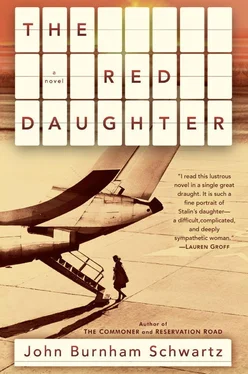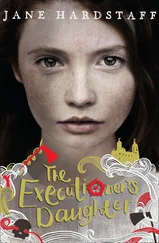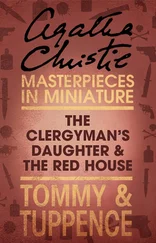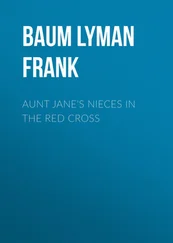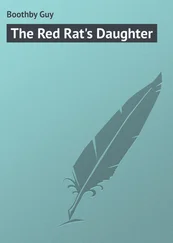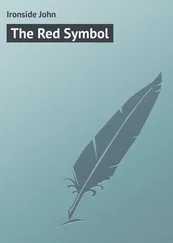Josef, I’m sorry.
He looked at me, but his heart was somewhere else.
Please forgive me?
My son’s nod suggested acquiescence at my request, rather than the sentiment itself.
If you’re still angry when Mama gets back, Katya remarked to her brother from the table where she was studying, you can tell her so then. But right now, if you ask me, you should just get over it.
Josef glared at her. After a moment, he went into the kitchen. I heard him filling a glass with water from the tap.
Mama?
Yes, my Katya.
Will you bring me back one of those colored cloth skirts?
A sari?
Yes.
With pleasure.
Something with some red in it, please. I have nowhere to wear it, but I can at least hang it on the wall.
Just then there came a knock on the door of our apartment. It was Mrs. Kassirova from the Ministry of Foreign Affairs, who would be accompanying me all the way to Delhi to make sure there were no surprises on my journey.
The snow has stopped, Mrs. Kassirova informed us.
And so it had.
—
Outside the foreign departures lounge I embraced Josef, who had driven us to the airport. He could come no further with me.
I’ll be home soon, I said, believing my own words.
We’ll be here, Mother, he replied solemnly. Have a good trip .
I kissed and hugged my son, my firstborn, and then I turned away from him toward the plane.
—
The Singh family lived along the bank of the Ganges, six hundred miles from Delhi. There were many of them, and though their son and I had never married, they welcomed me into their house like a newfound relative.
The day after my arrival, I watched wooden boats carry Brajesh’s ashes out into the river. After the ashes we tossed flower petals, which remained floating on the water’s surface long into the falling dusk.
The following morning, I was taken by an old woman to bathe in the same part of the river. Climbing out of the water, cleansed though not clean, I discovered flower petals stuck to my skin.
—
One day after another passed in that place, with those good people who were so kind to me. Each morning began with a bath in the Ganges in my sari, accompanied by the same old woman—one of Brajesh’s many aunts, whose name was Maya. The river was always crowded with people likewise bathing; one was never alone. It was a village, a community, an ongoing narrative in which I, a foreigner in every sense of the word, had no part, yet which absorbed me all the same. Each morning came to feel like a reenactment of that first morning after Brajesh’s funeral, when Maya had led me into the river the color of milky, oversteeped English tea so filled with the runoff of human life and death that, wading into it, one hand holding the hem of my borrowed sari and the other a small clay pitcher, it was as if the cool viscous weight climbing my legs, steadily rising, emanating an acrid bovine stink, was the hand and breath of all those who could not bring themselves to let go or give up. Here was a way station of some kind, I’d only half-understood, a hallowed, ever-flowing bridge between worlds: where our ghosts had not quite left us yet, were still with us, grasping on, and for these last minutes we might bathe in their ashes and shit with a sadness so keen it was almost like joy.
—
After bathing, Maya would sit with me on the riverbank as we dried ourselves under the rising sun. We communicated in the most basic English, though mostly we were silent. To her, I believe, I was simply a woman her nephew had loved, and who had loved him. That was enough. My Russianness, let alone the details of my personal history, any notions of status or legacy, power or shame that so completely defined me in my own world and determined who I was and would always be in the eyes of my own people, anything to do with Josef Stalin or the murder of countless millions—such biographical information was to her irrelevant, or perhaps even nonexistent. What she wished to know—all she wished to know—was about my children.
On our eleventh morning together, she asked me their names.
Josef and Katya, I told her.
Their ages?
Twenty-one and sixteen.
Were they healthy?
Yes, thank God.
And happy?
When instead of answering this last question I began to cry, Maya appeared unsurprised. Her smile was calm and knowing as she stroked my hair with her small wrinkled hand, her long fingernails pleasantly scratching my scalp, until my tears stopped.
—
That afternoon in my bedroom, which was decorated with only a few colored cloths, I fell into a sleep that overtook me like a sickness. I traveled so far down the tunnel of mental exhaustion that my dreams floated above me like clouds I could see but not touch. Within these ethereal masses, I somehow understood, were narratives of my past I had forgotten or never known; truths I must discover if ever I was to wake up. And I longed, as I slept, to know what these truths were.
—
I came awake two hours later, painfully clearheaded. The dream-clouds were gone. In their place, I sensed Josef and Katya close but not reachable, their loving, troubled spirits floating above me like airborne kites tied to a tree.
While I’d slept without dreaming under the spell of that old Indian woman’s touch, some space in my mind had cleared, and a realization had entered. I could not say how this had happened, but it had; nor could I honestly say that it was knowledge I’d been waiting for or wanted. But it had come just the same. And now I was awake.
Josef and Katya were trapped. They could not fly away because they were kites tied to a tree.
The tree was me. And it was my father. And like my father—like me, who every second of my life in the country of my birth had always been, and would always be, Josef Stalin’s daughter, a character written in blood in the ledger of his atrocities—the tree that was holding back my children was dead but still standing. It would always be standing in Russia, no matter the future. And it would always be dead.
So long as my children remained tied to that tree, I now understood, they would never be free.
Which left only one thing for me to do, if I truly loved them.
I had to cut the strings that held them.
And I must do it now, without thinking anymore, while I had the chance.
26 April
It is hard to know what time it is in the ballroom of the Plaza hotel, whether day or night. Ornate crystal chandeliers spread every couple of meters across the wood-paneled ceiling shine like unblinking stars. I am seated beside my handsome young lawyer, Peter Horvath, and his senior partner, Mr. Lucas Wardlow, Esquire—an elegant and distinguished older man of precious few words who, it is said, regularly beats the crafty Mr. George Kennan at cards—on a raised stage in the center of the massive room. The hundreds of reporters and photographers from newspapers around the world who have gathered to hear me answer questions appear as little more than faceless presences, mere reflections of the light shining from above.
Peter is wearing a different suit from our first day together, of brown wool carefully pressed, and a boyishly striped necktie. His short dark hair neatly parted to the side. Today for the first time I am aware that his eyes are an unusual shade of light brown, honeyed like walnuts.
One by one in a steady, slightly hoarse voice, Peter reads out the questions that we have agreed on in advance, and waits for my answers with a patient but curious leaning-in of his shoulders that reminds me once again of my brother Yakov. This, and the trembling edges of the sheet of typed questions in his hands, is the only sign of what must be a considerable case of nerves. Every so often, he casts a sideways glance at his boss, Wardlow, as if trying to gauge how things are really going.
Читать дальше
